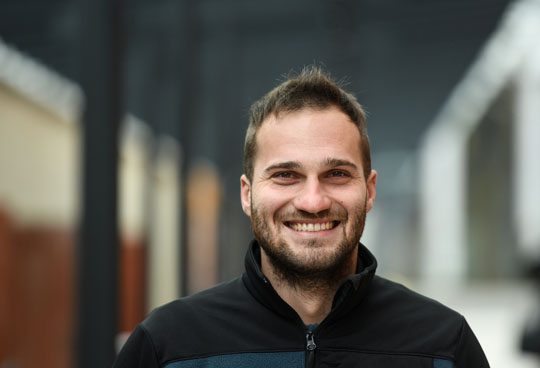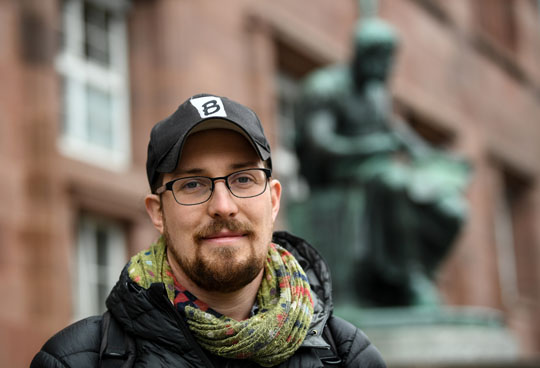Understanding the forest
Freiburg, Apr 04, 2018
Exploring the roots of forest science: students from around the world learn how forests and forest science work in Europe through the master’s degree program “European Forestry”. Six European universities jointly offer the master’s degree program. A series introduces seven other international collaborations.
 The students spend two years exploring the roots of forest science.
The students spend two years exploring the roots of forest science.
Photo: Kiwihug/Unsplash
The program “Master of Science in European Forestry” is coordinated by the University of Eastern Finland in Joensuu and offered in cooperation with five European universities: University of Freiburg, Agro Paris Tech in the French town of Nancy, University of Lleida in Spain, University of Natural Resources and Life Sciences in Vienna, Austria and – as a new partner, Transilvania University of Brasov in Romania.
The focus is on forest management and use at the international level. Students acquire a sound understanding of ecological conditions and their dynamics in Europe. For example, prospective forest scientists get to know the background of Mediterranean and boreal forests, in which mainly softwoods such as spruce and pine grow.
A difficult start
The European Union finances and supports the international master’s degree program. The fact that the University of Freiburg is participating in the program at all harks back to an initiative started by Prof. Dr. Heinrich Spiecker. Freiburg has been involved since 2001. Developing the course of study was not easy, especially since multiple bureaucratic hurdles stood in the way. Thanks to the EU Office at the University of Freiburg, they were successful, says Spiecker.
“Back then we spontaneously named the program ‘Master of Science in European Forestry’, which turned out to be the right one,” reminisces the professor for forest growth and dendroecology. “The title alone is good advertising.” It attracts students not only from Europe, but from around the world. In the class of 2017/2018, 23 students from 18 countries have enrolled for the master’s degree program, reports Marianne Stadler who coordinates the program. Three out of four participants come from Europe; the rest come, for instance, from Ghana, Brazil, Indonesia, Guatemala, Nepal and Bangladesh – that is, from tropical countries with different forest species and other ecological and economic challenges. The master’s degree program runs two years in which students attend classes held entirely in English.
The lure of a good reputation
A maximum of three program participants are selected from one country. “Interest in the program is extraordinarily high,” reports Spiecker, an advocate of international cooperation in education. The ratio is 300 applicants for two dozen slots. According to Spiecker, the program’s good reputation along with Freiburg’s Faculty of Environment and Natural Resources has developed its own dynamic, especially as Germany and France are considered the cradle of forest science and the program has been running for a long time. One of his former students, says Spiecker, is now a professor in Peking, a perfect opportunity to cultivate worldwide collaboration.
The students spend their first two semester at the University of Eastern Finland in Joensuu, the second two at one of the partner universities. A prerequisite for the master’s degree program is an appropriate knowledge level in English, more concretely the “Test of English as a Foreign Language“ (TOEFL) or the “International English Language Testing System.” The program includes a so-called Introductory Course, a six-week Field Course straight across Europe and an internship at a company or institution. The training provides a great background for holding a position at a college or research facility, says Spiecker - but the program qualifies participants for non-governmental or environmental organizations as well.
Alexander Ochs
Master of Science in European Forestry
● The master’s degree program begins every winter semester.
● Applications are accepted between November 1 and January 31 every year.
● The program runs for four semesters.
● The students spend two semesters at the University of Eastern Finland in Joensuu.
For more information

Rafael Bohn Reckziegel studies European Forestry.
“In Brazil, I dealt with tropical and subtropical forests and plantations. Through the 'European Forestry' program I have been able to get to know boreal and Mediterranean forests as well as forests in temperate zones - and different languages and cultures alike. The master’s degree program has helped me build a good international network."
Photo: Patrick Seeger

Aidan Stephens studies European Forestry.
“Forestry is incredibly diverse, from a practical perspective as well as the disciplines required for a successful career. Originally, I wanted to work as a firefighter for the US Wildland Firefighters during the summer. But then I decided to pursue a master’s degree instead because here I am able to learn, among other things, so-called lidar technology with which atmospheric parameters can be measured by laser. Even if the stress level during the program is constantly high - I wouldn’t want to do anything else.“
Photo: Patrick Seeger

